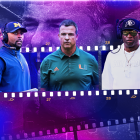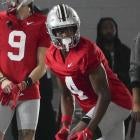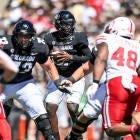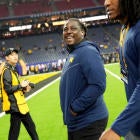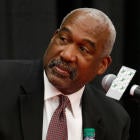A proposed bill in the Connecticut state legislature would create a "athletic protection commission" to monitor and enforce the safety for all NCAA athletes in the state.
If the bill ever passes -- and the concept is still in the very early stages -- it's believed Connecticut would be the first state to oversee college athlete medical care to this degree. State Reps. Matt Lesser and Patricia Dillon introduced the bill, which has support from the National College Players Association. NCPA executive director Ramogi Huma will testify Tuesday before the legislature's Higher Education and Workplace Committee.
So far, the bill's language is brief and vague, contributing to several athletic directors in Connecticut wondering why a commission is needed. The bill states it would be for the purpose of "protecting the health and safety of college athletes participating in an interscholastic athletic program by developing guidelines, gathering best practices, receiving and investigating complaints, and issuing remedies and penalties for violations."
Huma laid out the intent of the bill this way:
- Designate college, conference and NCAA staff as mandated reporters of suspected athlete abuse and violations of commission requirements. Huma said this could be the first state bill that would regulate the NCAA.
- Monitor and enforce best practices for player safety.
- Receive and investigate player abuse complaints, enacting penalties if allegations are substantiated.
- Provide whistle-blower protection for those reporting suspected player abuse.
"That's very much what [Huma] is interested in. I would love to see that too," said Dillon, one of the bill's co-sponsors. "I think [enforcement] is way ahead of where we are. Ramogi is probably a lot more ambitious than I am.
"We're going to have a budget issue [in Connecticut] this year, so it may be more modest what we look at.
"The schools are going to be very nervous about their own core mission. I want to hear what they have to say. They're going to have lawyers on their shoulders. You want to start a process to help the players where it's data driven without hurting anybody and not trying to create embarrassment."
Dillon said her biggest concern is addressing athletes who play through concussions or become addicted to opioids from painkillers used to mask injuries.
"The NCAA has changed and it's a business," Dillon said. "It wouldn't be a bad thing if the NCAA would do a little bit more on safety, if they got in front of it. The data may disprove me, but the image is the NFL is making progress and college athletics is not. I don't know if that's a fair image."
Though any commission in Connecticut is still a long way from ever passing, it's the latest example of states and cities considering their own measures to protect NCAA athletes.
In 2014, Boston passed laws requiring a neurotrauma consultant at every Division I football, ice hockey and men's lacrosse event. Boston also requires local colleges to have an emergency medical action plan for all venues and bans a player -- including those from the visiting team -- from reentering competition if suspected to have a concussion. It's not clear how the laws have been implemented and enforced, and whether they're doing what they intended.
California passed legislation in 2012 that in part requires athletic departments to have guidelines for concussions and dehydration. Guidelines also are required to supervise athletes with life-threatening health conditions who participate in sports.
"Unfortunately, this law doesn't go far enough," Huma said. "Case in point is the death of UC Berkeley football player Ted Agu, who had sickle cell [anemia]. If UC Berkeley had complied with this law, Ted would be alive."
The NCAA provides health and safety guidelines in many areas. Over the past two years, different NCAA divisions passed rules requiring that primary athletics health care providers have unchallenged authority for all medical decisions. The NCAA doesn't enforce safety guidelines.
But NCAA chief medical officer Brian Hainline, while not speaking specifically about the Connecticut bill, said the independent medical care legislation is going to cause NCAA schools to decide what to do when standard care isn't being practiced. The NCAA is getting "closer" to enforceable health rules, Hainline said.
But it's not happening fast enough for some like Huma, who has brought his latest cause to Connecticut. It's a progressive state that's home to the popular UConn men's and women's basketball teams, both of which have won multiple national championships. Attempts to speak with UConn athletic director David Benedict were not immediately successful.
Two years ago, Lesser -- the other co-sponsor of the latest Connecticut bill -- watched Huma's attempt to unionize Northwestern football players. Lesser introduced a bill that would define some NCAA athletes at public Connecticut universities as employees, allowing them to collectively bargain for increased benefits. The bill hasn't passed.
Several athletic directors in Connecticut question why this athletic protection commission is necessary.
"Do I really think there's this kind of need? The answer is no," Fairfield AD Eugene Doris said. "Normally, you hear the nightmare things behind the scenes. I don't get any sense that student-athletes are in any jeopardy in any way. All of my colleagues, to a person, would be appalled if it happened on their campus and would fire people if they found out something was occurring and not being done correctly."
Dillon seems to recognize the uphill climb her bill faces. She said an effort to collect youth concussion data at municipal levels in Connecticut failed because some towns and leagues became upset about an unfunded mandate and worried about liability.
Dillon said she has heard anecdotes about opioid abuse among college athletes. "I'd like to unpack the whole notion of playing through an injury," she said.
Like many states, Connecticut faces an opioid epidemic. The state's governor, Dannel Malloy, has described it as a "public health crisis." In 2015, 729 people in Connecticut died from accidental overdoses and officials expect the number will be closer to 900 in 2016, according to The Connecticut Mirror. Many bills have been introduced, including requiring physicians to prescribe opioids electronically rather than on paper.
"After the NFL issues came out a number of years back [with painkiller abuse by players], I wish all medical people had gotten out of the prescription business with players," Doris said. "But a doctor feels if he didn't do that, his services would be terminated because there's pressure from alumni on getting players to come back. Where you might find that to be an issue is at a larger school with that kind of pressure. We don't really get that kind of pressure [at Fairfield]."
Hartford interim AD John Carson said if policy changes are needed to address the epidemic, it's a lot easier to make changes through dialogue than "having big brother and big sister government pass laws that look nice on paper. The real issue is implementation and carry through."
Carson, who has served as a legislative liaison at Hartford, said the NCPA has a "clear axe to grind." Given that Connecticut's state budget projects to have a $1.5 billion deficit on July 1, Carson questioned how the state can create and staff a commission for NCAA athlete safety.
"A good, healthy dialogue is probably what's needed, and you don't get that in a general session [at the state legislature]," Carson said.
Sacred Heart AD Bobby Valentine, a former Major League Baseball player and manager, said a commission to protect NCAA athletes in Connecticut isn't totally unfounded. He declined to elaborate much due to his university's wishes.
"I understand both sides of the equation," Valentine said. "It's about the times, not necessarily anything other than that. It seems like these times are changing so I think it's time for me to fasten the seat belt and see what happens when the turbulence ends."













